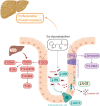Gut microbiota-derived metabolites as central regulators in metabolic disorders
- PMID: 33272977
- PMCID: PMC8108286
- DOI: 10.1136/gutjnl-2020-323071
Gut microbiota-derived metabolites as central regulators in metabolic disorders
Abstract
Metabolic disorders represent a growing worldwide health challenge due to their dramatically increasing prevalence. The gut microbiota is a crucial actor that can interact with the host by the production of a diverse reservoir of metabolites, from exogenous dietary substrates or endogenous host compounds. Metabolic disorders are associated with alterations in the composition and function of the gut microbiota. Specific classes of microbiota-derived metabolites, notably bile acids, short-chain fatty acids, branched-chain amino acids, trimethylamine N-oxide, tryptophan and indole derivatives, have been implicated in the pathogenesis of metabolic disorders. This review aims to define the key classes of microbiota-derived metabolites that are altered in metabolic diseases and their role in pathogenesis. They represent potential biomarkers for early diagnosis and prognosis as well as promising targets for the development of novel therapeutic tools for metabolic disorders.
Keywords: bile acid metabolism; intestinal microbiology; obesity.
© Author(s) (or their employer(s)) 2021. Re-use permitted under CC BY-NC. No commercial re-use. See rights and permissions. Published by BMJ.
Conflict of interest statement
Competing interests: HS received unrestricted study grants from Danone, Biocodex and Enterome; board membership, consultancy or lecture fees from Carenity, AbbVie, Astellas, Danone, Ferring, Mayoly Spindler, MSD, Novartis, Roche, Tillots, Enterome, Maat, BiomX, Biose, Novartis and Takeda and a co-founder of Exeliom Biosciences.
Figures



Comment in
-
Hidden link in gut-joint axis: gut microbes promote rheumatoid arthritis at early stage by enhancing ascorbate degradation.Gut. 2022 May;71(5):1041-1043. doi: 10.1136/gutjnl-2021-325209. Epub 2021 Jul 8. Gut. 2022. PMID: 34244347 Free PMC article. No abstract available.
References
Publication types
MeSH terms
Substances
LinkOut - more resources
Full Text Sources
Other Literature Sources
Medical
